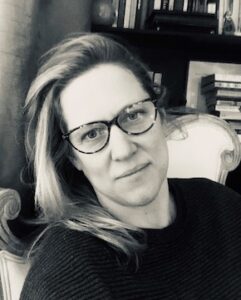The housewife and the convict
by Natasha RandallJenny stayed quiet on Saturday mornings during Hank’s online yoga class. ‘Welcome to your time,’ Leslie intoned. ‘Yes,’ said Jenny quietly, placing sound-cancelling headphones over her ears. The housevoice had informed her already that the quality of her sleep had been ‘poor’, that she had awoken twenty-six times during the night. She turned over and tried to go back to sleep. It was so luxurious to sleep in a bed by yourself. She sent one leg right across the bed diagonally and pulled all the pillows around her, settling into the position she liked best – the recovery position. But sleep didn’t resume and she opened her eyes to look at the bedroom curtains. Why were they so sunbleached already? she thought. But clean, they were clean, at least. The sun cleans things with its light. Water and light – these were cleansing elements with their waves that gently stroke at things. You bathe in sun and water. Perhaps she should have a bath.
As the taps were running, it annoyed Jenny that having a bath was an act of rebellion in her household. Hank didn’t believe that baths counted as bathing – since you soaked in your own filth. ‘Basically you redistribute the different dirts around your body. Just think about it. That is not becoming clean,’ he intoned. But the house could not detect if someone was having a bath or a shower and Jenny simply wanted a bath, she wanted to soak in a different medium. Air was too fizzy, too tingly – sometimes it seemed to her that she could feel molecules and photons hitting her skin. One day, she thought, she’d fill the bathtub with warm almond milk and have the most luxurious Cleopatran soak. Hank would be horrified, but he didn’t have to know.
It was healthy for spouses to have secrets, Jenny reminded herself as she reached up to the upper bathroom cabinets looking for something fragrant to put in her bathwater. Her grandmother had once warned her knowingly that marital secrets were inevitable. And lately, she had seen her point: little secrets were the pins of resistance. With secrets, you could escape the reflection you were trapped within – the picture of the person your spouse thinks you to be. Jenny liked baths and Hank didn’t have to know about it. Nor did he have to know about her crush on Barack Obama. (How she admired his integrity!)
Her new Bentonville life was so fat with ease, she told herself. ‘I have no reason really to complain,’ she told him. ‘I’m really very lucky.’ John’s life, on the other hand, was a savage hermitage.”
Hank also didn’t know about her correspondence with John, Inmate 6587 at Flainton Correctional Facility. It started as an outreach initiative she joined at the local church – and she had mentioned it to Hank at the time, but he had never asked about it and so he didn’t know she had been corresponding with John for nine months now, sharing light news, health worries and occasionally warmer, sometimes darker feelings. She sent him cookies every month, and if there was a nice Correctional Officer on duty then, sometimes he actually received them. John was so grateful for her letters, and his humility was breathtaking at times. He told her that he kept two pieces of paper, one in each pocket. One said: I am nothing. The other said: I am everything. The tone of his letters was sometimes a little strange, wooden maybe, until she realised that he was often quoting from the Buddha. John was a rookie Buddhist.
She went to retrieve his latest letter from her bedside-table drawer and perched on the edge of the bath to read it again.
Dear Jenny,
You ask good questions, Jenny, you’re a curious person. The sound of incarceration, that’s a nice way of putting it. There is nothing that I can do to keep the noise out I even have ear plugs I even tape bunches of tissue paper over my ears and I wear a hat over that and it probably looks real stupid. I lie on my bunk, and if I don’t block up my ears, all I can hear is banging, because people bang here. It’s not rhythm, its not tribal or primal or anything. This noise – its like being inside a broken clock. Guys rap at the bars on their beds, and they knuckle-punch at the steel on their doors. In my meditation practice I try to block it, or just hear the clangs and the clacks, and I think to myself energy is energy. But it’s hard to forget that people are angry here. Pent up.
I should probably tell you I have moved cells so that you can put the right address on your envelopes. (its still just as loud here though) I am now in Unit 5238, Block C3. Some new inmates have come in. I was just glad I got a new guy because I didn’t want to be put in with a cell warrior. The last guy was sharpening pens all day and trying to boil up some foul-smelling alcohol and I wasn’t going to get any sleep. There’s been trouble in the cells so I have to stay in my cell for a week and we’re not allowed to the vending machines or the exercise yard, and they’ve taken away our stuff but I borrowed a pen and some paper from a friend to write this. Anyway the whole block is on lockdown because someone stabbed a guy in the neck yesterday. I guess you might of sent cookies but I don’t think packages are getting through right now. They are supposed to check and make sure the mail gets to the right prisoner but when you change cells sometimes they just drop the packages in with someone else. Right now the guy I’m in a cell with cries all the time, someone said he got attacked on his first day and I guess he has some medical issues now. A guy got burned by someone else with an iron last week too, and they didn’t even take him to medical. Supposedly the guy burned him because in the morning he got too close when they were standing in line for food. People bust up here over the smallest things. You don’t even want to look at people or they can say you looked at them wrong and go at you.
Keep writing to me, Jenny. Long is the night to him who is awake.
Peace,
John
She sat on the edge of the bathtub, and for the hundredth time she felt awash with guilt. What was this intimacy she had struck up with a convict? They told each other things. Nothing too concrete; she was careful to use a post office box for their correspondence. She didn’t know anything much about John’s life before prison, that was true. At first, they had written to each other with light descriptions of their lives – Jenny told him about the patients at the plastic surgery clinic where she worked part-time, and John replied with the canteen menu and a record of how often the inmates were counted and checked – but, some letters later, they began to share their private horrors. John told her how the prison educators tried to make them get in touch with their rage by howling and roaring in group sessions. He said the shrieking had given him tinnitus. Sometimes he felt like he was spinning. Meanwhile, Jenny told him that she was tired, very tired, and that she felt like she was spinning too. ‘My washing machine has a silent spin,’ she once wrote to him, but later erased it. ‘Do you ever feel like you’re invisible?’ she asked him instead.
A tenderness, an unnecessary kindness, developed through their exchange. The convict and the housewife, the rough and the smooth – each with its own damnation. It was something about the thunder and lightning of his life, and the marshmallow numbness of her own. Her new Bentonville life was so fat with ease, she told herself. ‘I have no reason really to complain,’ she told him. ‘I’m really very lucky.’ John’s life, on the other hand, was a savage hermitage.
It had started by accident, almost. Father Brian had suggested the correspondence with prisoners after he read the parable about the goats and the sheep, and Jenny realised that she wanted to be a sheep, so she signed up. That is, wasn’t it the sheep who help the wretched, and thereby gain their places in heaven – while the selfish goats go to hell? Well, whichever was the good one, she wanted to be one of them. It wasn’t that she was such a good Christian – she was good, just not that kind of good – but most of all, she just wanted to ward off trouble. If she was good, then maybe other people would be good to her too.
John’s prisoner profile listed his crime as ‘voluntary manslaughter’ but Jenny had never asked him about his crime; it seemed like a very personal question. Of course, she could ask him, but she felt like she didn’t want him to have to explain himself to her that way. The court already convicted him, she didn’t need to do that. John had told her he was a good person who had made bad choices, and that one of his bad choices was that someone else was imprisoned as an accessory to his crime. He felt very guilty about it. The whole thing was a big mistake, he said. He hadn’t yet really told her in broad detail about his other bad choices but now Jenny was in her forties, she felt she knew about bad choices.
Bad choices. What a phrase. It’s the kind of phrase she carefully used with her children. She could hear herself saying: ‘You’re not a bad boy, but biting is bad behaviour.’ Her own bad choices were more protracted. She made long and slow bad choices. The kind you could regret only with decades of hindsight. For example, it was only now that she knew, she really knew, that she had made a mess of her twenties. Again and again, she had found herself out of her depth, but was so caught up in the manic pursuit of life that she hadn’t realised how totally vulnerable she had been. She had dated horrible jerks who had STDs and coke problems who left her stranded in far-away nightclubs in the middle of the night. She once accepted a drink from a stranger and was sure she’d been roofied when she woke up on a sofa in a place she didn’t recognise. She had lost her deposit on apartments to unscrupulous landlords whose telephone numbers never picked up. She had been shouted at by her bosses in ways she shouldn’t have accepted. One particularly vicious female boss even said into her horrified, tear-welling eyes, ‘Ah, it’s a pity that women cry so easily’. She had been to hypnotists and acupuncturists to gain the courage needed to forge ahead after these small brutalities.
‘But did I ever really make any choices?’ she wrote to John a few months back. ‘I mean, I feel like most things just happened to me. I didn’t really do them.’ He didn’t seem to understand her and responded that ‘even going along with things is a choice’.
‘O–ba–ma…’ she mouthed, noting through the earphones just how much of her voice she could hear passing through her nose. She stirred the cloudy, oily bath with her hand. She hoped Obama was the man she thought he was. He was wise – and how few, how very few wise people there were these days. She couldn’t think of any at all. Maybe Ellen DeGeneres – her wisdom was sewed into her humour. She’d heard that Ellen was mean in real life – but what did that matter? The Ellen that was projected into the world was kind and good. She cheered people on, she made them laugh, she gave them TVs. That will be her legacy. Like Obama – who read a lot of good books and spoke the kindest words. And when he danced with his wife, Jenny watched them avidly, the wide and tender take of their embrace, and Jenny imagined how that felt.
Was hers the right path? It seemed like a stupid word to apply to herself. The word applied to heroes. Along with ‘quests’ and ‘journeys’.”
Jenny had memorised one of his lines: ‘If you’re walking down the right path and you’re willing to keep walking, eventually you’ll make progress’. She had written it to John in a letter, and he had replied, expressing doubts about right paths – the thing is, he said, there are no wrong paths, just unhappy ones. This is what the Buddha says, he told her.
Paths, thought Jenny, slipping into her eucalyptus bath – was hers the right path? It seemed like a stupid word to apply to herself. The word applied to heroes. Along with ‘quests’ and ‘journeys’. But Jenny wasn’t on a path. She had removed her headphones temporarily to get into the bathtub and she could again hear the yoga mantras through the floor, saying ‘The past and the future are here and now’. Yes, she thought, not a path, more like a lonely treadmill.
Maybe Obama was talking about purpose. Jenny had one glaring purpose these days – to mother her children. It was nice to have a purpose, a crucial purpose. But ‘purpose’ wasn’t quite the right word. Motherhood was weighty. A vicious tenderness, coloured by the colossal horror that her children may die. And freedom – what exactly did that mean anymore? You couldn’t ever escape the state of motherhood – whether you were with your children and tending to them, or whether you were away from them. It didn’t matter: because they exist. They exist as though your very own beating heart was out in the world, walking around, vulnerable to the vagaries of street and forest. And so, you are never free of them. You’re locked in your own love. It was stupid to think of motherhood as a prison but that was how it felt, and Jenny really hoped that John would understand that without her having to spell it out. He was sent to prison, and they pushed him through a door and locked him in there. But Jenny felt like that dumb frog from the apocryphal story, the one that gets boiled: for so long she felt her life warming up nicely – she got a job, got a car, got a very handsome boyfriend, the handsome boyfriend proposed, she went part-time, and they started a family – but, soon, when it was already too late, she realised that she was trapped in a boiling role that would skin her of her ripening self.
She wondered: at the Pearly Gates (or whichever threshold awaited), what would she have to say for herself? She hated the epithets on gravestones, they were so confining. A gravesite of identity: Mother, Sister, Daughter, they said. It would be better to put down what people could have been – without the restraints they had suffered. Like: Mary, quite contrary, she should have planted millions of trees. Or: Little Bo-Peep, she might have clothed the whole town with her excellent knitwear.
Here lies Jenny, she thought, mother of two, wife to one, daughter, sister, niece. But she was a sheep, not a goat. Or a frog who thought it was taking a bath.
From Love Orange (riverrun, £18.99)
 Natasha Randall is a literary translator whose translations include Notes from Underground by Fyodor Dostoyevsky, A Hero of Our Time by Mikhail Lermontov, and We by Yevgeny Zamyatin. She edited A Place Bewitched and Other Stories by Nikolai Gogol for riverrun editions. Her articles and reviews have appeared in the TLS, LA Review and the NYT. She lives in London with her husband and young children. Love Orange, her debut novel, is published by riverrun in hardback, eBook and audio download.
Natasha Randall is a literary translator whose translations include Notes from Underground by Fyodor Dostoyevsky, A Hero of Our Time by Mikhail Lermontov, and We by Yevgeny Zamyatin. She edited A Place Bewitched and Other Stories by Nikolai Gogol for riverrun editions. Her articles and reviews have appeared in the TLS, LA Review and the NYT. She lives in London with her husband and young children. Love Orange, her debut novel, is published by riverrun in hardback, eBook and audio download.
Read more
natasharandall.com
@NatashaRandall
@riverrunbooks
Join fellow readers on Twitter for a #LoveOrange Buddy Read hosted by @riverrunbooks on Monday nights at 8pm from 14 September to 5 October, culminating in a live Q&A with Natasha.



